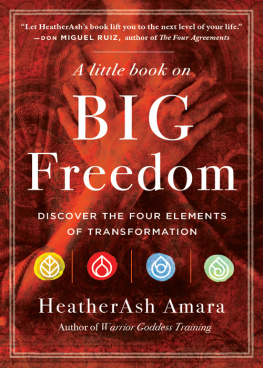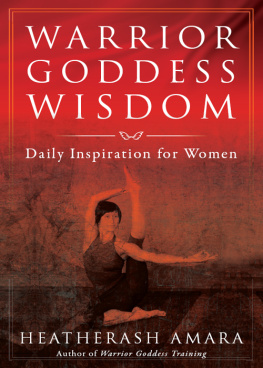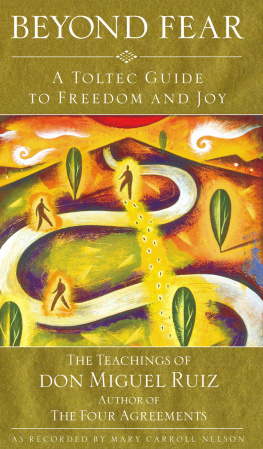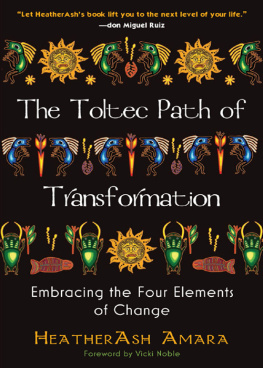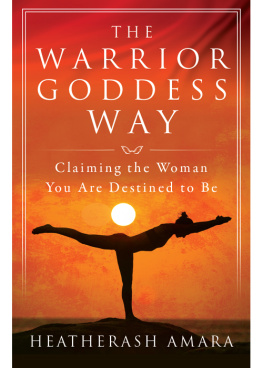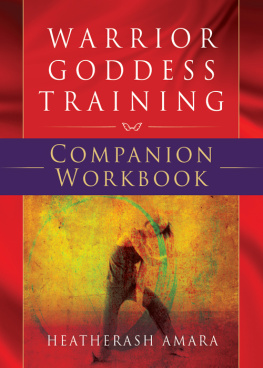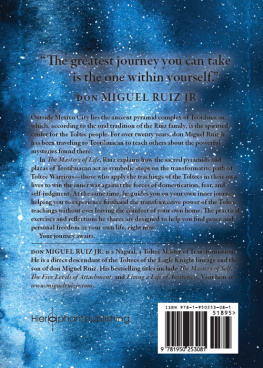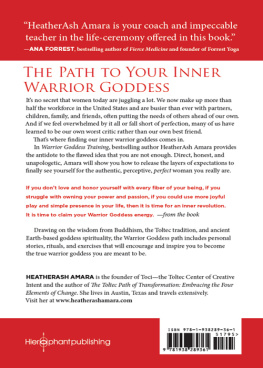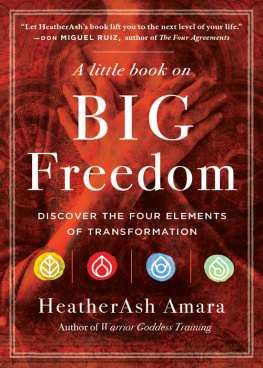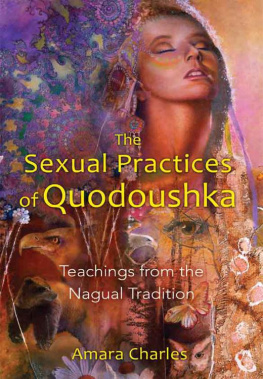

Copyright 2019 by HeatherAsh Amara
This book is adapted from The Toltec Path of Transformation: Embracing the Four Elements of Change by HeatherAsh Amara (Hierophant Publishing 2012). All rights reserved, including the right to reproduce this work in any form whatsoever, without permission in writing from the publisher, except for brief passages in connection with a review.
Cover design by Emma Smith
Cover art by:
Ananaline | Shutterstock
Anastasiia Firsova | Shutterstock
Elena Ray | Shutterstock
Interior Design by Frame25 Productions
Hierophant Publishing
www.hierophantpublishing.com
If you are unable to order this book from your local
bookseller, you may order directly from the publisher.
Library of Congress Control Number: 2019930731
ISBN: 978-1-938289-89-7
Printed on acid-free paper in the United States.
www.redwheelweiser.com
www.redwheelweiser.com/newsletter
May these words help all beings balance
mind, spirit, emotions, and body and
return to their authentic, divine center.
Every human has four endowmentsself awareness, conscience, independent will, and creative imagination. These give us the ultimate human freedom... The power to choose, to respond, to change.
Stephen Covey
Contents
Introduction
In oneself lies the whole world, and if you know how
to look and learn, then the door is there and the key
is in your hand. Nobody on earth can give you either
that key or the door to open, except yourself.
Krishnamurti
Freedom.
The word has an inspiring ring to it, one that promises release from bondage and stirs pure possibility. Its Old English and Germanic origins point to something even deeper, linking it to the word friend through a shared root that means to love.
Sometimes we use freedom to mean the ability to move around unfettered in the world and express ourselves openly. We can live where we want, associate with whom we want, and read books like this one in ways we mustn't ever take for granted. This type of external freedom is incredibly important. But the subject of this book goes even deeper.
This book is about another kind of freedomone which can only come from the inside. This is the freedom from inner negativity, harmful self-judgment, self-limiting beliefs, and emotional pain from past experiences. It's the freedom that grows from a profound friendship with our truest self, in which our beliefs and actions come from a place of love rather than fear. This is the freedom that blasts open your heart, pumps courage into your veins, and brings the knowledge that while you may not have a choice in what happens in the world, you always have a choice in how you respond.
This is what I call Big Freedom.
In my view, each of us is born with Big Freedom. You can see this in the eyes of a newborn baby, which reflect not an ounce of judgment or self-criticism, but rather a sense of wonder, awe, gratitude, and curiosity.
Yet as we grow up, things begin to change. We start to build walls around ourselves based on fears, beliefs, and traumatic experiences. Looking back, we see that some of these walls were necessary at the time; they likely protected us and kept us safe. But without us realizing it, these protective walls can become a prison and separate us not only from potential danger but also joy and connectedness.
One of the benefits of being an adult is that you get to break free of these confinements and choose how you want to live. You get to build the home of your dreams and live in Big Freedomright now.
Imagine yourself as a house. Your mind, body, and spirit are contained in this physical form. You have been building the house of yourself since childhood, very often basing it on other people's designs. Now, as an adult, if you had every resource at your disposal to remodel your life, how would you choose to do it? How would you make it a home base for the expression of the Big Freedom that is your birthright?
Whenever you begin any remodeling project, the first step is to assess the stability of the current structure. Do the floors of your internal house rest solidly on an abiding connection to your inner truth? Or are they precariously balanced on false beliefs and outdated agreements that you created or were told as a child? A shaky internal foundation allows anxiety, fear, and a feeling of scarcity to prevail throughout your home.
Our existing foundation was created early in life, sometimes from tiny events that have an outsize impact on our thoughts, feelings, and actions. Once we understand the mechanics of how our old house was built, we have the knowledge to then roll up our sleeves and begin rebuilding ourselves from the inside out.
Faulty Foundations
Each of us is formed and informed by certain core experiences. The following story is an example of a situation that activates common themes many of us experienced early in life: disappointment, confusion, misunderstanding, and fear. As you read it, see if you can remember any experiences in your own early life that created similar feelings within you.
I am three years old, playing with my rambunctious eight-year-old sister. We're laughing and gleefully running around the house, arms waving, feet barely touching the ground.
Suddenly, I hear a loud noise behind me, and I turn to see that my sister has accidentally knocked over a vase, which has shattered all over the floor. We freeze and look at each other, wondering what to do next. My sister shakes her head and says, We'd better clean this up before Mom comes back inside. But when we go into the kitchen to get the broom, we decide to have a snack first. Before long, the two of us are laughing and playing again, forgetting all about the vase.
Meanwhile, our mom has been outside working in the garden. She is hot, tired, and still upset over an argument she had with Dad earlier in the day. She's thinking about everything she needs to get done and trying to fortify herself to push through her current state of being physically and emotionally overwhelmed.
Mom's not-good day is about to get worse.
As she walks into the house, she hears my sister and I laughing and running around. Then she sees her grandmother's vasethe only thing her grandmother had ever given hershattered on the floor.
Even though she has rarely yelled or gotten upset with us, today she just loses it. She starts yelling, Who broke my vase?! Who broke my vase?!
My sister and I come running into the front room, both scared as she shouts at us about the vase, demanding to know who broke it.
In a panic, my sister points at me and says, She did it!
I look at her, and then at my mother, stuttering, I... I... I didn't
You! Go to your room now! Mom yells.
Now, close your eyes for a moment and imagine that you are a child and that you have just been punished for something you didn't do. How does this feel in your body? What thoughts are beginning to cycle through your mind?
You might have a strong emotional reaction, a tingling that fills you from head to toe. Physically, you may feel a churning in your stomach, a tightness in your throat, or a tearing feeling in your chest. You might be angry and feel betrayed. You may feel scared or confused.
The emotion itself is not the problem, but what we do next creates the fodder for most of our ongoing suffering as adults.
Next page
